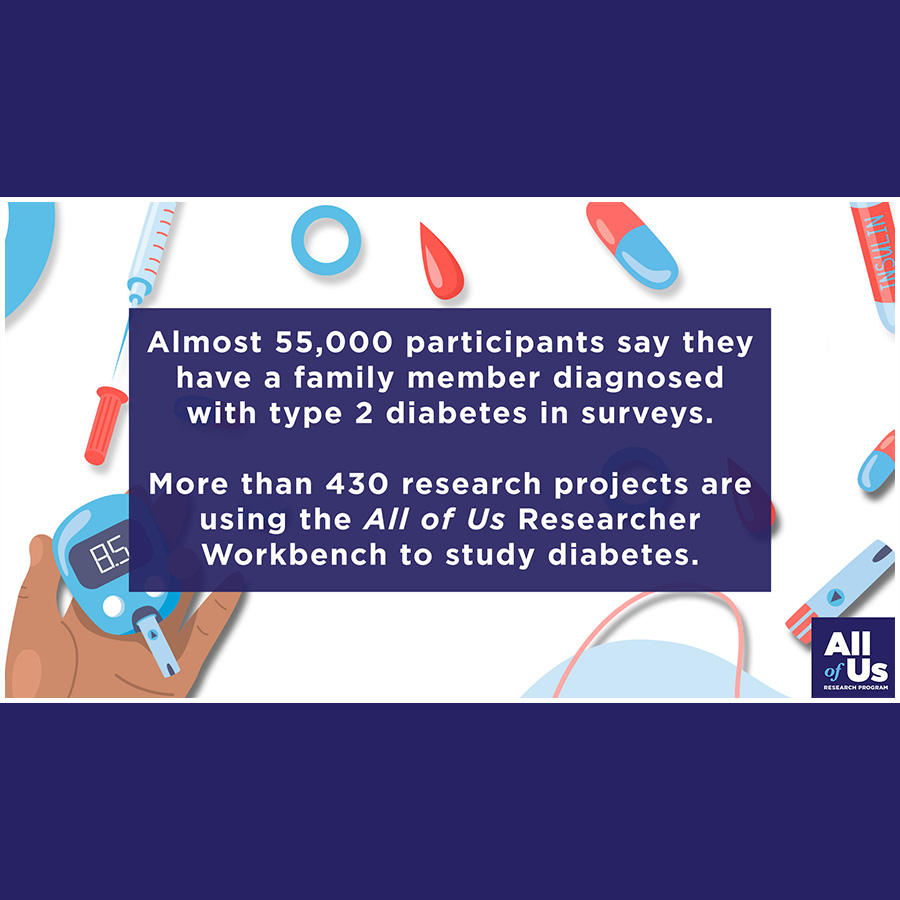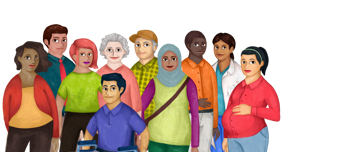
New data from the National Institutes of Health’s All of Us Research Program show that nearly 34,000 participants who contributed data from electronic health records are living with type 2 diabetes. Nearly 55,000 participants have shared that type 2 diabetes has affected a close family member. These data and more could offer researchers new clues on diabetes risk and treatment response.
There are more than 37 million people in the United States living with diabetes, which includes those who have type 1, type 2, gestational and other types of diabetes. These conditions carry the risk of complications like heart disease, nerve damage, kidney disease and vision loss and makes it a top public health challenge. According to the Centers for Disease Control and Prevention, 90-95% of people diagnosed with diabetes have type 2 diabetes.
“Diabetes is an individualized disease. Our genes, environment, access to health care and other factors can make a big difference in whether we develop the disease or how healthy we are living with it,” said Andrea H. Ramirez, M.D., M.S., chief data officer of the All of Us Research Program. “There is so much to discover about diabetes, and the participants who choose to share data with researchers are setting the stage for new discoveries that have the potential to improve the health of everyone at risk of diabetes.”
Diabetes hits some communities harder than others, including Hispanic/Latino and Black and/or African-American communities. Compared to white adults with diabetes, Black and/or African-American adults are 60% more likely to be diagnosed with diabetes by a physician, 2.5 times more likely to be hospitalized with diabetes and its long-term complications, and twice as likely to die from the disease. Compared to white adults with diabetes, Hispanic adults are 70% more likely to be diagnosed with diabetes by a physician, twice as likely to be hospitalized for treatment of end-stage renal disease related to diabetes, and 1.3 times more likely to die from diabetes.
All of Us looks to increase diverse representation in medical research to help scientists better understand these disparities. More than 75% of All of Us participants identify with communities that have been historically underrepresented in biomedical research, and about 45% identify with a racial or ethnic minority group.
Participants can contribute data from DNA, surveys, electronic health records, physical measurements and wearable devices. These different data types help researchers study the disease in new and different ways. For example:
- Researchers from Florida A&M University used data from electronic health records and surveys to identify diabetes patients at highest risk of a heart attack, stroke or heart failure.
- A study led by the Broad Institute of Harvard and MIT combined data from All of Us participants with other large genomic studies to explore whether specific gene variants could be tied to diabetes in Latino populations. The size and diversity of the All of Us Researcher Workbench led the research team to identify 26 genetic signals, which could lead to better ways to predict diabetes in Latino people.
- A study led by the Vanderbilt University School of Medicine used Fitbit data to better understand the link between physical activity and diabetes. The researchers found that people with an average daily step count of 10,700 had a 44% lower risk of developing diabetes than people who averaged 6,000 steps a day. This benefit held true, regardless of age, weight, sex or time otherwise spent inactive.
More than 720,000 people have joined All of Us since it began national enrollment in 2018.
People interested in participating in the All of Us Research Program can learn more at www.JoinAllofUs.org. Researchers can register and begin using the All of Us data at www.ResearchAllofUs.org.
